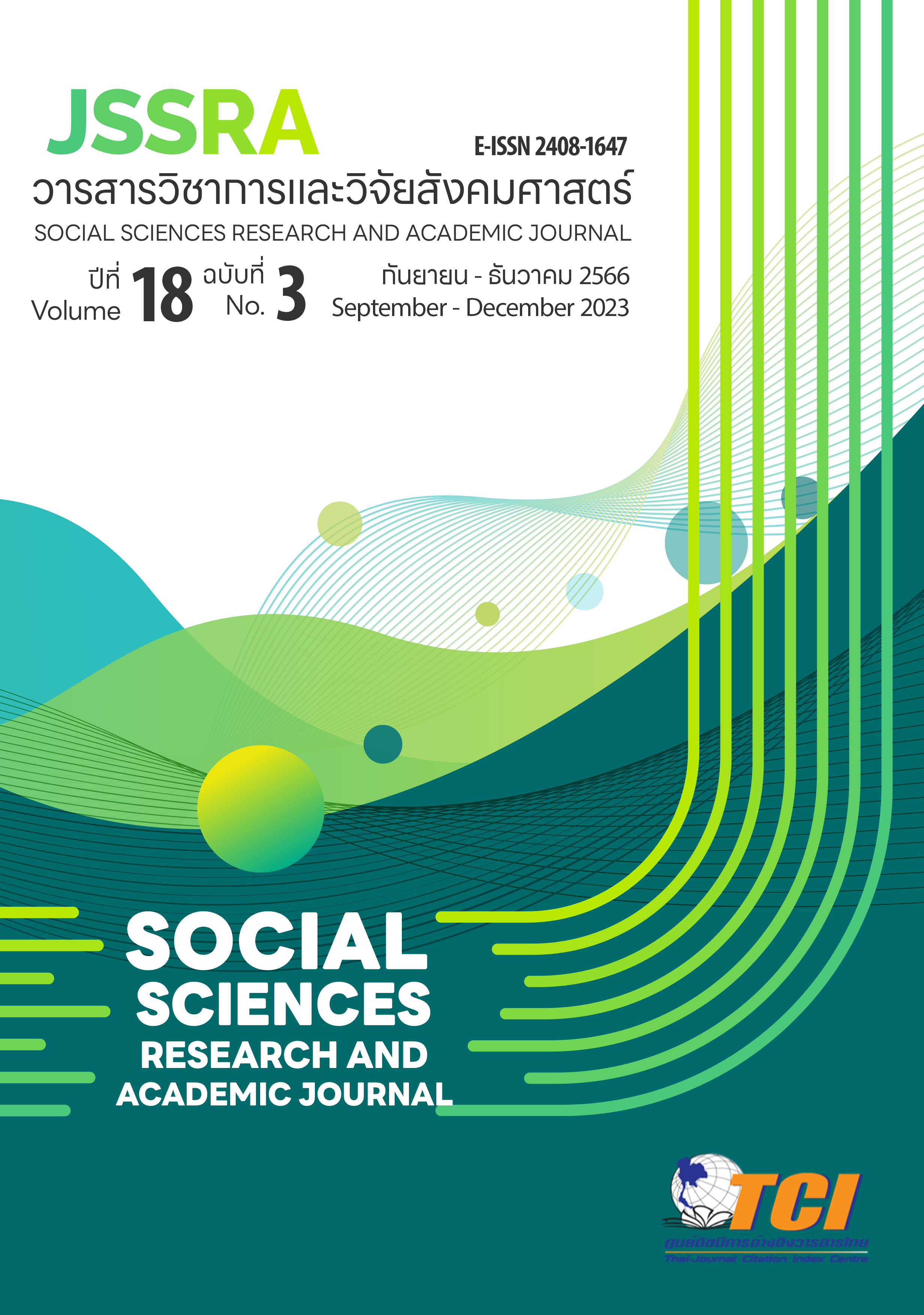กระบวนการเรียนรู้เพื่อพัฒนาตนเองของเกษตรกรปลูกหม่อนเลี้ยงไหมหัตถกรรม Learning Process for Self Development of Traditional Serculture Farmers
Main Article Content
Abstract
The purposes of this study were to 1) examine the factors that encourage traditional sericulture farmers in a community context and 2) analyze the learning process for self development of traditional sericulture farmers. Qualitative research using in-depth interviews was conducted with 21 key informants from three community enterprises: Ban Nong Bua Phae Silkworm Group Community Enterprise, Ban Ang Toei Silk Weaving Community Enterprise, and Ban Pa Kluai Silkworm Group Community Enterprise. The research tools were a semi-structured interview questionnaire, observations, and the researcher. The data were analyzed by content analysis.
The results revealed that the factors that encourage traditional sericulture farmers in a community context and in the production process for mulberry silk handicrafts are: 1) expertise in knowledge gained from experience; 2) readiness of farmers physically, mentally, and emotionally aspects; 3) social integration; and 4) support of government agencies and educational institutions. The learning process of traditional sericulture farmers was studied, and it was discovered that a learning process for self-improvement can be divided into three phases: The first phase begins in the house, the starting point of basic wisdom, and farmers begin the learning process by transferring it within the family. The second phase, knowledge development, is obtained from the public sector and educational institutions, through self-practice and through research engagement with educational institutions. The third phase includes the extension of knowledge to creativity, and the design of the fabric pattern is the identity of the group.
Article Details
References
กรมหม่อนไหม. (2560). รูปแบบการเลี้ยงไหม. สืบคนเมื่อ 7 ตุลาคม 2564, จาก https://qsds.go.th/2021/09/02/รูปแบบการเลี้ยงไหม.
กรมหม่อนไหม. (2565). แผนปฏิบัติราชการระยะ 5 ปี (พ.ศ. 2566 – 2570). กรุงเทพฯ: ม.ป.ท.
กระทรวงศึกษาธิการ. (2542). พระราชบัญญัติการศึกษาแห่งชาติ พ.ศ. 2542. กรุงเทพฯ: โรงพิมพ์คุรุสภาลาดพร้าว.
ชุมญาณัช คำวงษ์. (2561). การส่งเสริมการผลิตและจัดการผลิตหม่อนไหมตลอดห่วงโซ่อุปทาน. กรุงเทพฯ: ชุมนุมสหกรณ์การเกษตรแห่งประเทศไทย จำกัด.
ณัฏฐภัทร์ กิ่งเนตร, และณัฐนรี มณีจักร. (2562). ความเหลื่อมล้ำมิติอาชีพของไทย: กรณีศึกษาในอาชีพเกษตร. สืบค้นเมื่อ 6 มกราคม 2564, จาก https://www.bot.or.th/Thai/MonetaryPolicy/EconomicConditions/AAA/Inequality_4GiniCoefficient.PDF.
ณัฐทิณี รตานนท์, และอาแว มะแส. (2558). กระบวนการเรียนรู้ของชุมชนในการเลือกยุทธวิธีการดำรงชีพสู่ความยั่งยืน: ศึกษากรณีชุมชนบ้านใจดี. วารสารสมาคมนักวิจัย, 20(3), 157-170.
ทิศนา แขมมณี. (2548). ศาสตร์การสอน องค์ความรู้เพื่อการจัดกระบวนการเรียนรู้ที่มีประสิทธิภาพ. กรุงเทพฯ: สำนักพิมพ์แห่งจุฬาลงกรณ์มหาวิทยาลัย.
นนทลี พรธาดาวิทย์. (2559). การจัดการเรียนรู้แบบ Active Learning. กรุงเทพฯ: บริษัท ทริปเพิ้ลเอ็ดดูเคชั่น จำกัด.
ประเสริฐ บุญเรือง. (2555). การจัดการศึกษาตลอดชีวิต. วารสาร กศน, 5(1), 3-7.
ปาณมน จันทบุตร, และสุนีย์รัตน์ วุฒิจินดานนท์. (2563). คำจำกัดความ การแบ่งหมวดหมู่ การวัด และการรายงานทุนทางปัญญา: การทบทวนวรรณกรรม. วารสารวิทยาการจัดการมหาวิทยาลัยสงขลานครินทร์, 37(2), 165-194.
พิทูร ชมสุข, จิราภรณ์ พินนาพิเชษฐ, และเพชรลักษณ์ บุญญาคุณากร. (2564). เกษตรกรยุคใหม่ อาชีพทางเลือก (ทางรอด) ในยุคโควิด 19. สืบค้นเมื่อ 23 พฤษภาคม 2564 จาก https://www.bot.or.th/Thai/ResearchAndPublications/articles/Pages/Article_11May2021-2.aspx.
วีรฉัตร สุปัญโญ. (2548). การพัฒนาตนเองกับการศึกษาตามอัธยาศัย. วารสารศึกษาศาสตร์, 5(1), 63-78.
ศิริพร บุญชู, ทิพาธร มาศจรูญ, สุนันทา พ่วงเสมา, กนกวรรณ คุณาธรรม, สมคิด ทองช่วย, กรรณิการ์ สนธิ, และคนอื่น ๆ. (2559). การศึกษาสถานภาพการผลิตการตลาดไหมในประเทศอาเซียน. สำนักงานกองทุนสนับสนุนการวิจัย.
สมคิด ทองช่วย, อัจฉรา เกษสุวรรณ, และรวิพิมพ์ ฉวีสุข. (2564). ปัจจัยสู่ความสำเร็จเพื่อการตลาดที่ยั่งยืนในอุตสาหกรรมผ้าไหมไทย. วารสารสมาคมนักวิจัย, 26(4), 142-160.
สุจิตรา ธนานันท์. (2554). การพัฒนาทรัพยากรมนุษย์. (พิมพ์ครั้งที่ 6). กรุงเทพฯ: ห้างหุ่นส่วนจำกัด ทีพีเอ็น เพรส.
สุพัตรา ชาติบัญชาชัย. (2549). กระบวนการเรียนรู้: แนวคิด ความหมาย และบทเรียนในสังคมไทย. กรุงเทพฯ: โครงการเสริมสร้างการเรียนรู้เพื่อชุมชนเป็นสุข (สรส.).
อรศรี งามวิทยาพงศ์. (2549). กระบวนการเรียนรู้ในสังคมไทยและการเปลี่ยนแปลง: จากยุคชุมชนถึงยุคพัฒนาความทันสมัย. กรุงเทพฯ: วิทยาลัยการจัดการทางสังคม.
Bhattarcharjya, D., Alam, K., Bhuimali, A., and Saha, S. (2019). Perspectives of Sericultural Farming for Sustainable Development. In P.K. Paul & B.K. Santra (Eds.), Ecology, Sustainability and Technology: The Paradigm Shifting (pp. 79-101). New Delhi: New Delhi Publishers.
Bower, G. H., and Hilgard, E. R. (1981). Theories of learning. Englewood Cliffs, N.J: Prentice-Hall.
Gogus, A. (2012). Bloom’s Taxonomy of Learning Objectives. In: Seel, N.M. (eds) Encyclopedia of the Sciences of Learning. Springer, Boston.
Vianmana, S., and Nohmi, M. (2020). Study on Factors Creating Additional Income among Good and Excellent Silk Weaving Groups in Northeast Thailand. Journal of Rural Problems, 56(1), 19-25.


